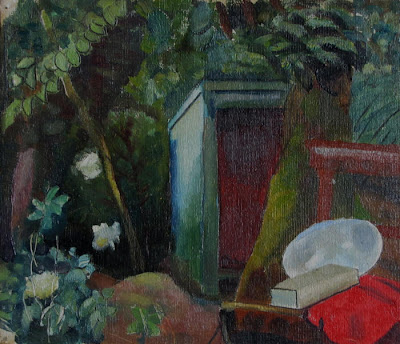Eileen Aldridge, "The Downs near Brighton, East Sussex" (1962)
The Knight's Tomb
Where is the grave of Sir Arthur O'Kellyn?
Where may the grave of that good man be? --
By the side of a spring, on the breast of Helvellyn,
Under the twigs of a young birch tree!
The oak that in summer was sweet to hear,
And rustled its leaves in the fall of the year,
And whistled and roared in the winter alone,
Is gone, -- and the birch in its stead is grown. --
The Knight's bones are dust,
And his good sword rust; --
His soul is with the saints, I trust.
Ernest Hartley Coleridge (editor), The Poetical Works of Samuel Taylor Coleridge (Oxford University Press 1912).
Stephen McKenna, "Foliage" (1983)
Robert Devereux, Earl of Essex, who wrote the following untitled poem, was a knight. In the last two lines, he hauntingly anticipates the poems by Coleridge, Masefield, and Chesterton.
Happy were he could finish forth his fate
In some unhaunted desert, most obscure
From all societies, from love and hate
Of worldly folk; then might he sleep secure;
Then wake again, and give God ever praise,
Content with hips and haws and bramble-berry;
In contemplation spending all his days,
And change of holy thoughts to make him merry;
Where, when he dies, his tomb may be a bush,
Where harmless robin dwells with gentle thrush.
Robert Devereux, Earl of Essex, in Norman Ault (editor), Elizabethan Lyrics (1925).
I say "hauntingly anticipates" for the following reason: Devereux was beheaded in February of 1601 for alleged treason against Elizabeth I.
Dane Maw, "Woolverton and Peart Woods" (1970)








